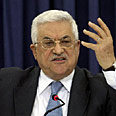Abbas says will alter voting law to block Hamas
Palestinian president for Fatah says he will change electoral rules next week to hamper Hamas' ability to win parliament majority in elections. Abbas welcomes new 'seriousness' in Israeli approach to negotiations, swears he will not speak to Hamas until they've 'apologized to the Palestinian people'
Palestinian President Mahmoud Abbas said on Thursday he would decree a change in Palestinian electoral rules that might make it harder for Hamas Islamists to maintain the parliamentary majority they won last year.
However, pressed to say whether the early elections that he has promised would be held as soon as this year, Abbas said he could not set a date yet. Nor could he yet say whether he would run himself for re-election as president.
In an interview at his West Bank headquarters in Ramallah, Abbas said parliamentary and presidential elections must be held simultaneously in the West Bank and Gaza Strip - a condition that leaves the timing uncertain, given the opposition of Hamas leaders who seized control of Gaza from Abbas' forces in June.
Abbas said that, after he has met the Central Electoral Commission on Friday, he will not only issue decrees setting early elections but also decree that parliamentary polls be contested only by nationwide party lists, scrapping constituency seats which were crucial to Hamas' victory in January 2006.
"We will amend the electoral law," the president said, adding that decrees could be issued as early as next week.
"I will use Article 43 of the Basic Law, which gives me the power to make those changes, to change the electoral law to a single national list instead of having two lists, one national and one by constituencies," he said.
Under the existing rules, half the seats in parliament are allocated to parties according their share of the national vote and half are allocated to local constituencies.
Some constitutional experts question Abbas' right to appoint a new government and amend the constitution by decree following his dismissal of the Hamas-led government in the wake of the rift with Gaza. Some say he needs parliamentary approval.
No date set for elections
Abbas said he could issue the decrees on elections next week. Voting is not scheduled until 2010 and some critics note that the Basic Law has no provision for calling early elections.
Asked if he could say whether voting could take place as early as this year, Abbas said: "No I can't give any dates now."
Asked whether voting could take place in the West Bank while leaving an election in Gaza aside or holding it over for later, he said: "We do not want to divide the homeland.
"We are seeking elections in both the West Bank and Gaza. There can be no division according to the electoral law."
Aides to the president, who took power on the death of Yasser Arafat in 2005, say he makes little secret of not wishing to prolong his own mandate. However, asked if he would seek re-election, he said: "It is too early to say."
Asked if he felt that was possible before US President George W. Bush steps down in 18 months - as Bush himself hopes - Abbas said that depended on direct talks with Israel.
He welcomed what he called a new "seriousness" on the part of Israel but stressed Palestinians still wanted to negotiate all key matters, the "final status" issues, as a package.
"We have heard a position in the media," he said, referring to Israeli officials' suggestions that Prime Minister Ehud Olmert might seek a "declaration of principles" on such issues as national borders before a final agreement on matters such as the status of Jerusalem and the rights of Palestinian refugees.
"But," Abbas said, "We cannot delay any issue among the final issues and then say that we have finalized something.
However, with Hamas there could be no negotiation, he said - even if Haniyeh appeared outside his office to talk to him: "I will not meet with any of Hamas' leaders before they retract every step of the coup they carried out.
"They must change what they did in Gaza and apologize to the Palestinian people. Only after that will we might talk."
















